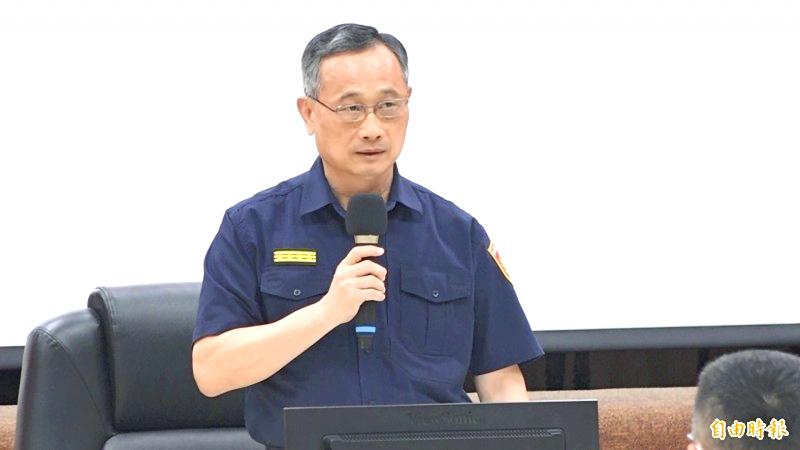Hundreds of additional police officers are to be deployed to safeguard public security in the buildup to a recall vote against Kaohsiung Mayor Han Kuo-yu (韓國瑜) on Saturday next week, National Police Agency (NPA) Deputy Director-General Tsai Tsang-po (蔡蒼柏) said yesterday, amid reports of gangsters planning to cause disruptions and dissuade people from voting.
“We are deploying additional law enforcement units and upgrading the alert level, with the NPA to deploy 500 officers to Kaohsiung to prepare for the recall vote,” Tsai told lawmakers at the legislature in Taipei.
“The NPA and the Kaohsiung Police Department have established a task force led by Kaohsiung prosecutors to coordinate efforts and any investigation,” he said. “There will be rolling reviews in the coming days to make adjustments for new developments in Kaohsiung.”

Photo: Lee Hui-chou, Taipei Times
The additional officers’ duties would include patrolling polling stations to uphold regulations against filming, violence and other illegal activities, to prevent voter intimidation, Tsai said.
He agreed with lawmakers that police must remain impartial in their work and uphold the democratic system to ensure eligible voters can cast their ballots, regardless of their political inclination.
NPA Director-General Chen Ja-chin (陳家欽) on Tuesday traveled to Kaohsiung to coordinate police efforts, saying that authorities had received information about criminal elements planning to interfere in the recall vote by filming voters, disrupting lines at polling stations and other possible intimidation tactics.
“We will not tolerate activities that interfere with voting. I have demanded immediate action if there is any violence by gangsters at polling stations,” Chen said.
Asked about gangsters’ purported plans yesterday, Han said: “I am very shocked. If this is true, then the police chief should set up a task force immediately to investigate.”
Chinese Nationalist Party (KMT) Kaohsiung City Councilor Huang Shao-ting (黃紹庭) questioned the need for additional police resources.
“We do not know where the police chief got his information. He should not speak about unsubstantiated reports, which stoke public anxiety and fear,” Huang said. “If police see criminals preparing to take illegal action, then they should investigate, but they should not speak about unsubstantiated rumors.”
Democratic Progressive Party Kaohsiung City Councilor Chen Chih-chung (陳致中) told reporters that “we have residents telling us that criminal elements are preparing to film at polling stations to ‘monitor’ voting.”
“It has led to people worrying about their safety and feeling threatened,” he said. “Others have said that they are afraid of violence breaking out at polling stations.”
“The police chief has ordered a strong law enforcement presence by deploying additional units for the recall vote. What is wrong with that? Why have Han and KMT officials opposed this and accused the police chief of speculation?” he added.

AIR SUPPORT: The Ministry of National Defense thanked the US for the delivery, adding that it was an indicator of the White House’s commitment to the Taiwan Relations Act Deputy Minister of National Defense Po Horng-huei (柏鴻輝) and Representative to the US Alexander Yui on Friday attended a delivery ceremony for the first of Taiwan’s long-awaited 66 F-16C/D Block 70 jets at a Lockheed Martin Corp factory in Greenville, South Carolina. “We are so proud to be the global home of the F-16 and to support Taiwan’s air defense capabilities,” US Representative William Timmons wrote on X, alongside a photograph of Taiwanese and US officials at the event. The F-16C/D Block 70 jets Taiwan ordered have the same capabilities as aircraft that had been upgraded to F-16Vs. The batch of Lockheed Martin

GRIDLOCK: The National Fire Agency’s Special Search and Rescue team is on standby to travel to the countries to help out with the rescue effort A powerful earthquake rocked Myanmar and neighboring Thailand yesterday, killing at least three people in Bangkok and burying dozens when a high-rise building under construction collapsed. Footage shared on social media from Myanmar’s second-largest city showed widespread destruction, raising fears that many were trapped under the rubble or killed. The magnitude 7.7 earthquake, with an epicenter near Mandalay in Myanmar, struck at midday and was followed by a strong magnitude 6.4 aftershock. The extent of death, injury and destruction — especially in Myanmar, which is embroiled in a civil war and where information is tightly controlled at the best of times —

China's military today said it began joint army, navy and rocket force exercises around Taiwan to "serve as a stern warning and powerful deterrent against Taiwanese independence," calling President William Lai (賴清德) a "parasite." The exercises come after Lai called Beijing a "foreign hostile force" last month. More than 10 Chinese military ships approached close to Taiwan's 24 nautical mile (44.4km) contiguous zone this morning and Taiwan sent its own warships to respond, two senior Taiwanese officials said. Taiwan has not yet detected any live fire by the Chinese military so far, one of the officials said. The drills took place after US Secretary

THUGGISH BEHAVIOR: Encouraging people to report independence supporters is another intimidation tactic that threatens cross-strait peace, the state department said China setting up an online system for reporting “Taiwanese independence” advocates is an “irresponsible and reprehensible” act, a US government spokesperson said on Friday. “China’s call for private individuals to report on alleged ‘persecution or suppression’ by supposed ‘Taiwan independence henchmen and accomplices’ is irresponsible and reprehensible,” an unnamed US Department of State spokesperson told the Central News Agency in an e-mail. The move is part of Beijing’s “intimidation campaign” against Taiwan and its supporters, and is “threatening free speech around the world, destabilizing the Indo-Pacific region, and deliberately eroding the cross-strait status quo,” the spokesperson said. The Chinese Communist Party’s “threats